Each month the CrimeReads editors make their selections for the best upcoming fiction in crime, mystery, and thrillers.
*
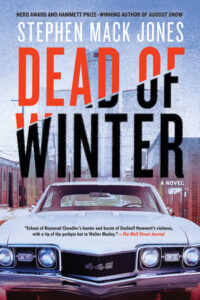
Stephen Mack Jones, Dead of Winter
(Soho)
Stephen Mack Jones’s August Snow series has been a true revelation for detective fiction, and in this, the third installment, the world just keeps getting richer and more nuanced and the writing more incisive. Here, Snow is approached by the head of a local institution, Authentico Foods, who is being strong-armed by an anonymous antagonist. Snow decides to help, and the investigation soon takes in a shadowy real estate operation and the attempted gentrification of Detroit’s Mexicantown. This is a crime novel that takes on big social issues with style and insight. –Dwyer Murphy, CrimeReads Editor-in-Chief

Kathy Wang, Impostor Syndrome
(Custom House)
This is the Silicon Valley spy novel we’ve all been waiting for, with a side order of biting satire and furious feminism. In 2006, Julia Lerner is an orphaned Muscovite with a computer science degree. 12 years later, she’s one of the most powerful women in Silicon Valley, sending sensitive information to her Russian handlers when she’s not busy crushing the competition to her social media company employer or being the keynote speaker on work/life balance at yet another conference. Things start to heat up when an underling stumbles on a suspicious use of data, and the two begin an epic game of cat-and-mouse with gasp-worthy consequences. –Molly Odintz, CrimeReads Senior Editor
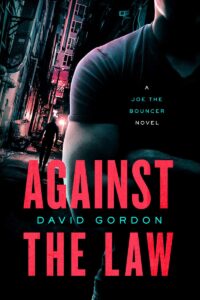
David Gordon, Against the Law
(Mysterious Press)
With his new “Joe the Bouncer” novel, Gordon has a unique and worthwhile series on his hands: a throwback to the wild crime series of the 70s from writers like Donald Westlake and Lawrence Block, writers who infused their crime capers with a kind of urbane wit that threaded together all the action. In Against the Law, Joe, still plying his trades as a strip club bouncer by night and a mob fixer by other times. takes on a job tracking down a mysterious heroin source. Pretty soon, he’s at the center of it all, the only man who can prevent a gang war erupting on city streets, and keeping the peace is going to require his skills as a former special ops man and, relatedly, a master thief. Gordon’s writing is consistently sharp and funny, and he conjures up a vivid, sleazy, exciting vision of New York. –DM
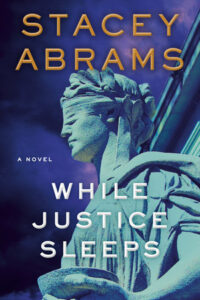
Stacey Abrams, While Justice Sleeps
(Doubleday)
Stacey Abrams is known for crafting delicious romance novels when she’s not campaigning for voter rights, but 2021 brings a special treat: her first ever legal thriller!!! A young law clerk for an enigmatic Supreme Court Justice finds herself in the midst of intrigue and danger as she tries to carry out a seeming-wild-goose-chase after her mentor ends up comatose. She forms an uneasy partnership with the judge’s estranged son, as the two race against time to find the culprit behind the dastardly deeds. Action-packed and full of good people doing badass things! –MO
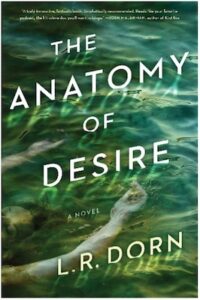
L.R. Dorn, The Anatomy of Desire
(William Morrow)
Anatomy of Desire, the debut offering from L.R. Dorn (Matt Dorff and Suzanne Dunn) is an audacious crime novel, a stylistically daring retelling of Thedore Dreiser’s An American Tragedy that takes the form of an oral history, or better yet the script of an investigative docuseries. If that sounds like a new reading experience, that’s the point. The result is an immersive text that takes us inside the search for a missing woman, a Los Angeles social influencer last seen on a lake with another woman found dead. Dorn captures the cadences—and the excitement—of a true crime podcast while maintaining the depth of perspective and experience of a novel. –DM

Mia P. Manansala, Arsenic and Adobo
(Berkley)
Mia P. Manansala won the Eleanor Taylor Bland Award from Sisters in Crime for her early work on her debut, and I couldn’t be happier to see her creative new cozy series come to fruition. In Arsenic and Adobo, Manansala has all the ingredients for a fantastic culinary cozy—a recently returned daughter, meddling relatives, a failing restaurant, and a dead restaurant critic. Also, try to read this one without ordering food online. I dare you. –MO
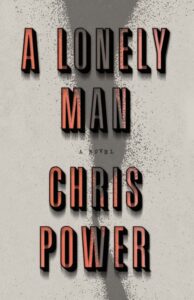
Chris Power, A Lonely Man
(FSG)
An apparently chance meeting in a bookstore launches the story of Chris Power’s intricate, searching debut. The meeting is between two Brits in Berlin, one a writer in search of his next book, the other claims to be a ghostwriter on the lam, hired to write a book for a Russian oligarch, a man who was shortly after killed. The bizarre tale connects the two, but in unusual ways, as both seem to be testing the other’s sense of reality, art, fiction, truth, and lies. A Lonely Man is an uncanny novel in the best sense possible. The mystery comes in readers efforts to untangle the many disorienting layers of narrative, asking themselves whether anything in this compelling world is authentic, and whether that’s the right question at all. –DM
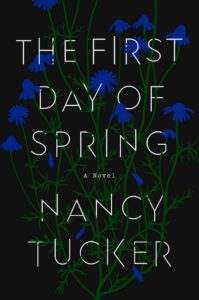
Nancy Tucker, The First Day of Spring (Riverhead)
The First Day of Spring is a strange combination of heartwarming, disturbing, and devastating. It begins with a murder—8-year-old Chrissie has killed a small boy, her motives obscure, and her pleasure at the act unquestioned. Two decades later, Chrissie is living under a new name with her young daughter, whom Chrissie is terrified of losing. As we follow her on a desperate journey to her old haunting grounds, interspersed with slow reveals of horrific neglect suffered by Chrissie in her own childhood, we begin, perhaps, to understand her childhood act, and to see a path toward redemption. –MO

Gin Phillips, Family Law
(Viking)
Phillips Family Law is at once a thriller, a searing legal drama, and an intimate portrait of family life in flux. Set in 1980s Alabama, the story follows a lawyer and a young woman who comes into her orbit in an unexpected and intense way. Phillips evokes the era’a tensions with precision and power, but more than anything Family Law is a closely observed novel about friendship, closeness, and trauma. –DM

Ben Winters, The Quiet Boy
(Mulholland)
Ben Winters is know for his quiet, noir takes on science fiction and alternative history, but his latest goes in an entirely new direction as Winters looks at the long consequences of a botched medical procedure and explores the nature of vengeance. The Quiet Boy is split between two timelines and two legal cases: in 2008, a family sues a hospital for malpractice after their child’s health is damaged by a routine procedure, while ten years later, the family’s patriarch is now the one on trial: for the murder of a key witness from the first trial. –MO

















